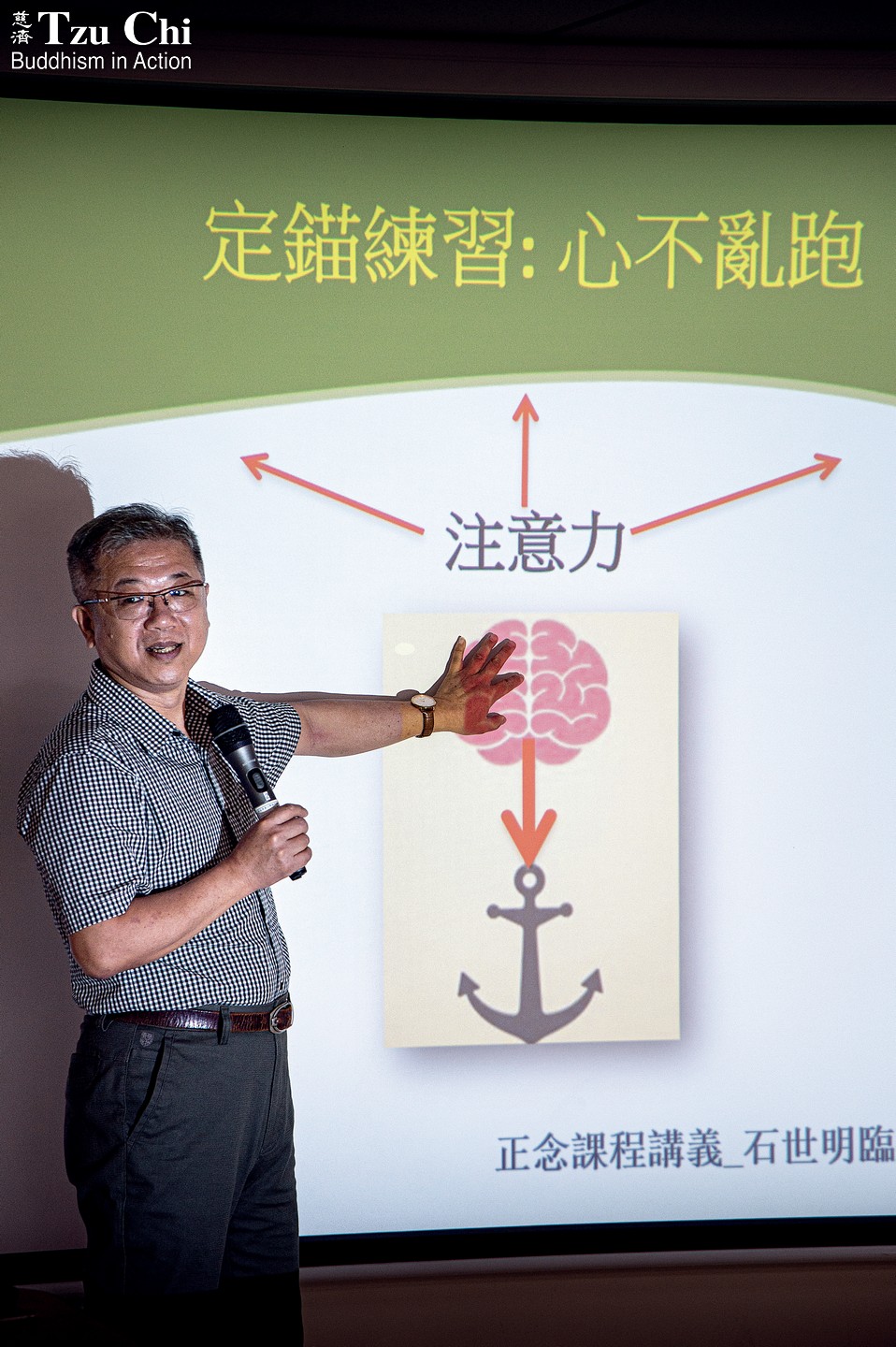By Hong Jing-jing
Translated by Wu Hsiao-ting
Photos by Huang Xiao-zhe

Incorporating mindfulness into your daily routine has been proven to reduce inflammation and strengthen the immune system. Ground yourself in the present moment to nurture your overall well-being.
“When was the last time you saw the blue sky and white clouds? I often ask my audience this question during my lectures and find out that over half of them haven’t looked up at the sky that day. Also, can you recall the sequence of traffic light colors at an intersection?” These words were spoken by clinical psychologist Shih Shih-ming (石世明). He often uses simple questions like these to encourage people to become more attentive in their daily lives.
In the bustle of our lives, our minds are in a perpetual race. While we’re doing A, our thoughts jump to B, and when we’re engaged in B, our minds wander to C, all on autopilot. As our attention drifts, our thoughts frequently become entangled in past memories or future worries. Moreover, when faced with stress or negative experiences, our emotions can become overwhelming and difficult to manage.
Miss A, a physical therapist in her 40s, was diagnosed with stage four ovarian cancer a year ago. She faced this formidable challenge with resilience, enduring ten grueling rounds of chemotherapy. However, the constant fear of a relapse cast a heavy shadow over her life. Anxiety gripped her on the eve of every follow-up appointment, robbing her of precious sleep and necessitating the use of sleeping and anti-anxiety pills.
In April of this year, she enrolled in a two-month course on mindfulness and initiated a daily mindfulness practice. She paid deliberate attention to the present moment, employing techniques such as mindful breathing and walking. Whenever negative emotions surfaced, she refocused on her breathing, reminding herself: “Thoughts are just thoughts, not facts; don’t take them seriously.” Every evening before bedtime, she listed ten things that had brought her happiness and gratitude during the day.
During the two-month mindfulness course, she gradually reduced her nightly dose of sleeping medication from a full pill to a half, and finally to a quarter. Previously, she would often wake up several times during the night, but now she could enjoy a full six and a half hours of uninterrupted sleep. More significantly, her emotional well-being improved markedly. She no longer experienced persistent anxiety throughout the day, nor did she struggle with motivation. Additionally, her follow-up medical reports provided reassurance by confirming that her cancer was under control.
The body, mind, and spirit have a mutual influence on each other. When the mind frees itself from distress and anxiety, the body undergoes a corresponding positive transformation.
Our thoughts often wander in our daily lives. Here, clinical psychologist Shih Shih-ming explains the concept of mindfulness practice and recommends dedicating ten minutes each day to anchoring your attention to a single focal point, like your breath, and following its natural rhythm to help train your mind to remain steady.

Mindfulness incorporated into traditional therapy
In 1979, Dr. Jon Kabat-Zinn, a molecular biologist with a Ph.D. from the Massachusetts Institute of Technology, established a stress reduction clinic at the University of Massachusetts Medical School’s affiliated hospital. Combining mindfulness meditation practices with a Zen-inspired approach, he created an eight-week Mindfulness-Based Stress Reduction (MBSR) program. The program aimed to help patients effectively manage stress, alleviate pain, and address the psychological challenges associated with illness. The program’s outstanding effectiveness transcended the limitations of conventional medical treatments available at the time, earning widespread recognition and acclaim.
Mindfulness therapy has since become a medical treatment option. More than 700 hospitals and medical centers in the United States, the United Kingdom, Canada, Australia, and other countries now offer MBSR.
Shih Shih-ming, the clinical psychologist mentioned earlier in this article, has received professional training in mindfulness-based stress reduction under the guidance of Dr. Jon Kabat-Zinn. He explains that British clinical psychologists have incorporated mindfulness into conventional cognitive behavioral therapy for depression. After two decades of research, they confirmed the preventative effects of mindfulness-based cognitive therapy for individuals experiencing recurrent depressive episodes.
Dr. Linda E. Carlson, a professor in the Division of Psychosocial Oncology in the Department of Oncology at the University of Calgary in Canada, developed her Mindfulness-Based Cancer Recovery program based on Jon Kabat-Zinn’s mindfulness-based stress reduction. This program has demonstrated its effectiveness in alleviating various physical and psychological symptoms experienced by cancer patients. It has also exhibited a positive impact on the immune system, resulting in reduced inflammation markers.
What exactly is mindfulness, and why is it capable of reducing stress and even influencing the immune system?

Engage all five senses to fully grasp the sensation and taste while eating a raisin. Similar practices are employed in mindfulness courses to enhance concentration and awareness.
Chronic pain alleviated
According to Kabat-Zinn, mindfulness is “the awareness that emerges through paying attention, on purpose, in the present moment, and non-judgmentally to the unfolding of experience moment by moment.”
Shih Shih-ming further elaborated by saying, “Mindfulness isn’t about positive thinking or attempting to alter thoughts; it revolves around observing things as they are and gaining insight into how the mind shapes our experiences.” He added that mindfulness training comprises practices such as seated meditation, mindful breathing, body scans, eating mindfully, and walking with awareness. The primary objective is to anchor attention to the breath or engage the five senses (sight, sound, smell, taste, and touch) to cultivate mental discipline and foster heightened awareness. This approach helps prevent the mind from being carried away by the swirling currents of habitual emotional reactions.
In response to stress and negative emotions, people tend to resort to various coping mechanisms such as suppression, avoidance, or positive thinking. However, as underscored by Shih, the approach advocated by MBSR emphasizes acceptance. In the practice of mindfulness, thoughts and sensations are observed without resistance or pursuit. One of Kabat-Zinn’s famous teachings emphasizes that if your mind wanders from the breath a thousand times, your task is simply to gently guide your attention back to the breath each time. Over time, these practices gradually help rewire neural connections influenced by past life experiences.
“Mindfulness helps people understand how their minds operate,” Shih said. “It can be integrated into existing treatment methods for addressing mental and physical health issues to improve treatment outcomes.” A clinical study supported by the U.S. National Institutes of Health explored the effects of mindfulness-based eating practices on conditions such as anorexia and bulimia. The results showed that these practices could change unconscious and unhealthy eating patterns by promoting mindful awareness with every bite, thereby contributing to improved health.
Dr. Lee Jia-fu (李嘉富), a psychiatrist at Taipei Tzu Chi Hospital, offered further evidence of the positive influence of MBSR. He pointed out that neuroimaging research in medical literature has revealed that mindfulness can lead to structural changes in the brain, enhancing the function of regions like the prefrontal cortex, which is associated with conscious awareness, the hippocampus, responsible for memory and learning, and the sensory cortex and insula, which are connected to bodily and visceral sensations.
“Mindfulness practices can also reduce the intensity of chronic pain,” Lee added, “and the effect can persist for a period after participating in a mindfulness program.” He further noted that studies have also shown that mindfulness courses and mindfulness-based cognitive therapy can influence various physiological markers, such as blood pressure and stress hormones, effectively alleviating stress, depression, and anxiety levels in cardiovascular patients and improving some symptoms in rheumatoid arthritis patients.
Mindfulness can be seamlessly woven into everyday life. According to clinical psychologist Chen Yi-jia, practicing mindfulness during activities such as walking involves a heightened awareness of the sensation with each step on the ground. Extend this attentiveness to everyday tasks like eating, drinking, doing laundry, and even driving, all of which can become opportunities for mindfulness practice.

Embracing life’s beauty
In 2014, Taipei Tzu Chi Hospital introduced an MBSR program to help sufferers of mental health conditions and patients in daytime wards navigate their way toward emotional and physical equilibrium. Chen Yi-jia (陳宜家), a clinical psychologist at the hospital, pointed out that common clinical conditions like depression and anxiety often keep the body in a constant state of heightened alertness. Through mindfulness practices, patients can reset their long-established automatic stress responses, reducing unnecessary activation of the sympathetic nervous system and allowing the parasympathetic nervous system to reinstate a sense of relaxation, stability, and security.
Chen highlighted that depression is often accompanied by detrimental cognitive patterns, such as self-deprecation and self-blame, coupled with feelings of helplessness and despair about the future. Patients with anxiety disorders tend to overestimate and obsess over potential dangers and threats, leading to intense concerns about their safety and the safety of others. As a result, they may misinterpret ordinary physiological responses, such as a rapid heartbeat, shortness of breath, or dizziness, as signs of severe illness, thereby exacerbating their anxiety and panic.
Chen shared that she has guided many patients in practicing mindfulness over the years. The feedback she received indicated that patients experienced increased self-confidence, decreased inner anger, improved sleep quality, and a healthier appetite.
Mindfulness practices stress the importance of being fully present in the moment, including being attuned to one’s bodily sensations, emotions, and thoughts. With the practices, individuals become more aware of what they are experiencing and find better ways to respond to various situations.
For example, picture yourself engrossed in household chores or rushing to prepare dinner when your child arrives home wearing a gloomy expression. Your initial thoughts might tend to be, “He’s in trouble again!” or “I’m already so tired, and he’s only making things more difficult.” These thoughts can quickly escalate into conflict.
When confronted with such situations, try to distinguish if your negative emotions are provoked by your physiological sensations, like hunger or fatigue. It’s crucial not to let these momentary bodily sensations, emotions, or thoughts dictate your responses. This reduction in emotional turbulence enables you to maintain your focus on the present, continue with the task at hand, or pause and listen to the other party with a non-judgmental attitude. As Chen aptly noted, “By objectively assessing a situation, you can uncover more effective solutions and manage stress in a healthier way.”
She added, “One of the goals of mindfulness practice is to foster a greater awareness and presence in both the present moment and one’s overall life.” This shift, she highlighted, allows individuals to more deeply cherish and relish the beauty of the present moment. Engaging in mindfulness practices, which can involve all five senses, helps people to, for example, better savor the taste of food, enjoy the sound of rain, and feel the breeze on their skin, fostering an increased appreciation for the richness life offers.
When one can fully appreciate the taste of every bite of food and remain mindful while walking, standing, sitting, or lying down, they can reconnect their disengaged body and mind. In this way, everyone can make strides toward improving their physical and mental well-being.
What Is Mindfulness?
The mindfulness taught by Jon Kabat-Zinn, the creator of the Mindfulness-Based Stress Reduction program, is not about positive thinking, and it is unrelated to religion. Kabat-Zinn defines mindfulness as “the awareness that emerges through paying attention, on purpose, in the present moment, and non-judgmentally to the unfolding of experience moment by moment.”
This practice often involves anchoring your focus on your breath, sensing the inhalation and exhalation, the rise and fall of your abdomen, and maintaining an awareness of your bodily sensations. If your thoughts wander, gently guide them back to your breath.



